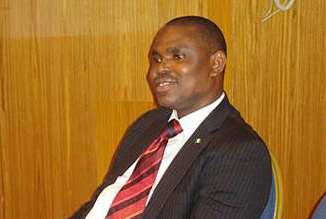The Financial Reporting Council of Nigeria (FRC) has accused the Central Bank of Nigeria (CBN) of condoning “unwholesome disclosure and reporting practice” at Stanbic IBTC Plc.
Godwin Emefiele, the CBN governor, had written to Jim Obazee (pictured), the FRC executive secretary, over the suspension of four directors of Stanbic IBTC directors for “financial misstatements”.
Emefiele said FRC lacked the authority to suspend the directors, while the bank itself said FRC was only courting publicity.
But Obazee, in a letter dated November 10, 2015, has repeated the allegations against the bank and accused the banking regulator of condoning an unwholesome practice.
Advertisement
Obazee wrote: “The inclusion of donation expense of N275 million, which is not a charitable donation under the tax laws, and therefore does not qualify as a deductible expense, would have led to an understatement of the tax expense and current tax liability for the accounting period. This is as a result of the tax authorities not being able to identify such expense because it is lumped up under ‘Others’.
“The use of the judgment to capture donation under ‘Others’ should have been disclosed by directors as part of the Accounting Policies of the entity.
“One wonders why the CBN is condoning and vehemently defending an unwholesome disclosure and reporting practice such as this. The only plausible reason will be that the CBN actually approved these financial statements.”
Advertisement
The full text of FRC’s letter to CBN
RE: REGULATORY DECISION IN THE MATTER OF FINANCIAL STATEMENTS OF STANBIC IBTC HOLDINGS PLC FOR YEARS ENDED 31ST DECEMBER 2013 AND 2014 CLARIFICAT ION.
Please refer to your letter to our Council dated 2nd November 2015 but received at our branch office in Abuja by 6:30pm on 3rd November 2015. The letter under reference addressed certain matters in the regulatory decision of our Council which the CBN grouped under “Financial Issues”, “Legal issues” and “Implications of FRCN’s Actions on Nigeria’s Financial System Stability”. We hereby write to provide the CBN with some clarifications.
Contrary to the postulation in paragraph 2 of the CBN letter, we wish to state that the Financial Reporting Council of Nigeria Act. 2011 (hereinafter referred to as FRC Act 2011) and the Financial Statements of Stanbic IBTC are not, and can never be, in contention. The CBN letter also claimed that “the CBN revisited the Stanbic IBTC to scrutinize all underlying records relating to the relevant financial statements”. This is surprising! Permit me to remind you of the sequence of events:
Thursday, October 29th, 2015
Advertisement
His Excellency, the Chief of Staff to Mr. President, met with you and I in his office and advised that we schedule a meeting to come up with a harmonized position as two regulators on the review of the Financial Statements of Stanbic IBTC for years ended 31st December 2013 and 2014. He went further to state that the CBN should also be sanctioned if it is discovered that the errors observed in the said financial statements are true because the CBN approved the said financial statements before they were issued. At that meeting, you claimed that what the CBN has done since you received the Regulatory Decision of the FRC was to get an opinion from a consortium of lawyers on the provision of the FRC Act 2011. You said your next step was to invite foreign lawyers to review the opinion you received. You even sought the permission of His Excellency, the Chief of Staff, and read out selected paragraphs of the opinion you got from the consortium of lawyers. At the end of that meeting, His Excellency, the Chief of Staff, directed as follows:
a) That you should write to the management of Stanbic IBTC directing them to immediately stop all negative publicity being sponsored against the FRC. He directed you to send a copy of that letter to me. (Up till now, you are yet to send a copy of that letter to my office and Stanbic IBTC has simply increased the negative publicity to even include my person). He also said that the FRC should not put up any write-up again in the newspapers but, that if Stanbic IBTC writes on FRC, the FRC is entitled to a rejoinder .
b) That a team from the CBN should visit Stanbic IBTC to review the records again to know whether the errors were due to oversight or incompetence or compromise.
c) That the FRC should secure a written position on the matter from the external auditors of Stanbic IBTC.
Advertisement
d) Finally, that you and I should agree a date to meet thereafter and review the documents received and reach a final decision.
Immediately, after that meeting you and I met in the waiting area of the office of the Chief of Staff and agreed to meet on November 10, 2015 . I told you that I would just have returned from a United Nations meeting on International Standards of Accounting and Reporting where I was to preside over the opening ceremony, and also speak on country case study on monitoring of Compliance and Enforcement of high quality financial reporting.
Advertisement
Friday, October 30th, 2015
You telephoned to inform me of your agenda on how you intended to deal with your own side of the directive by the Chief of Staff. You said that on Monday, 2nd November, 2015, you would meet with the Directors of Stanbic IBTC; Tuesday , 3rd November , 2015, you would meet with the External Auditor s of Stanbic IBTC; Wednesday , 4th November, 2015 you would meet with other relevant parties including shareholder groups that have been petitioning to regulators, and finally on Thursday , 5th November, 2015, CBN will meet with the FRC.
Advertisement
I responded to your call by first drawing your attention to another write-up in Thisday Newspapers of 30th October 2015, front page, painting the FRC in bad light and reminded you of the letter you were to write to Stanbic IBTC and copy my office (you told me that you had read the story in the newspaper and you believed it was sponsored by Stanbic IBTC and that you were going to call the Chairman of Stanbic IBTC, Mr. Atedo Peterside, immediately). I also informed you that I would not be available to meet with you on Thursday , 5th November, 2015 because I was to speak in a United Nations event on Friday, 6th November, 2015 in Geneva, Switzerland. I told you that if you urgently needed to meet with me, I could come and see you in Abuja the following morning, Saturday, 31st October, 2015. You informed me that you do not work on weekends.
Meanwhile, my office had written to KPMG, Professional Services (giving them seven working days) to send to the FRC relevant documents as advised by His Excellency, (the Chief of Staff). We also wrote to you informing you of this development and attached a copy of the letter to KPMG, Professional Services; duly acknowledged by them.
Advertisement
Saturday, 31 st October, 2015 and Sunday, 1st November, 2015 were weekend days that you claim you do not work.
Monday, November 2, 2015
The CBN issued a letter to our Council, and posted it on the internet, claiming the CBN had cleared Stanbic IBTC and maligned the FRC. The said letter to our Council, which the news media noted with pride was leaked to them, did not get to our office in Abuja until 6.30p.m. on Tuesday, 3rd November, 2015.
I have taken time to outline this sequence of events to you so as to let you know that the CBN has not acted in good faith and that the actions of the CBN were calculated to embarrass the FRC and indeed the Federal Government of Nigeria.
Let us now address the issues in the letter from CBN:
A) FINANCIAL ISSUES
1) The CBN mixed up the issues and ended up with very wrong and hasty conclusions. The regulatory decision of the FRC refers to a particular “Purchase and Assignment of a Banking Application software” request made to NOTAP by Stanbic IBT on July 3, 2013 which is another transaction other than the one your letter addressed.
Let me reproduce the section of the Regulatory decision to you to guide the retraction of the CBN’s hasty conclusion:
“SALE, PURCHASE AND ASSIGNMENT AGREEMENT
On 6th July, 2012, Stanbic IBTC issued a final signature version of a Sale, Purchase and Assignment Agreement between Standard Bank of South Africa Limited and Stanbic IB TC Bank Plc on a banking Application Software. The said Application Software was developed by Stanbic IBTC Bank Plc, Nigeria. The Source Code was disclosed without a NonDisclosure Agreement signed by both parties. It should be noted that Standard Bank of South Africa operates in 17 (seventeen) countries in Africa and claim that they engage in shared use of banking software wherein the developer gets annual fee from the others in the group as long as the banking application software is in use. Accordingly , Stanbic IBTC Bank Plc (a subsidiary of Stanbic IBTC Holdings Pie) and the Group, as the developer of the software, are expected to disclose its expenses on Research and Development costs relating to the development of the software in the Statement of Profit or Loss and Other Comprehensive Income and carry a figure for its intangible asset in its Statement of Financial Position for the capitalised portion of the expenses (as contained in the accounting policy on intangible asset in the Stanbic IBTC financial statements for year ended 31st December 2014).
Instead, on 3rd July, 2013 (one year after) Stanbic IBTC submitted the said Sale, Purchase and Assignment Agreement between Stanbic Bank Plc and Standard Bank of South Africa Limited to NOTAP requesting NOTAP to approve and register that the application Software is sold to Standard Bank of South Africa for a fee of ZAR 151, 586,277 and that the Nigeria bank has ceded all its rights to the software to the purchaser and now have the Nigeria bank become one of those in the seventeen countries paying annual license fees for the use of the software. NOTAP declined the application and advised that Stanbic IBTC license the application software in Nigeria instead.
This was not adhered to by Stanbic IBTC but went ahead with their plan anyway and neither reported the sale of the said software nor showed any annual fee income relating to it in their Statement of Profit or Loss and Other Comprehensive Income nor carry the intangible asset in their Statement of financial Position in the financial statements for years ended 31st December 2013 and 2014.”
In paragraph 4 of your letter, the CBN claimed that Stanbic IBTC actually obtained the necessary approval. This assertion is not correct because we have a letter from the National Office for Technology Acquisition and Promotion (NOTAP) stating clearly that this request was not approved.
The Regulatory Decision is not about the intangible asset that the CBN letter addressed in paragraph 5 relating to the disposal of software which was disclosed in the financial statements of Stanbic IBTC for year ended 31st December 2012, although this transaction itself is well laden with its own poor accounting and disclosure issues as hereunder:
– The transfer/reclassification of computer software in 2012 of N 1,367,000,000 was not properly accounted for in the financial statements. Where the amount was reclassified to was not disclosed. Note that an exact amount appears under the “Total” column of the Property and Equipment schedule, under transfers/reclassification, which itself is incorrect since transfers/reclassification should end up with a “NIL” balance. The correlation between these two disclosures, computer software and proper y and equipment (N1,367,000,000) could not be established. The loss on the disposal of this intangible asset was also not disclosed.
These inconsistencies and poor disclosures make the financial statements esoteric and incomprehensible even to financially literate users.
Please note that the software/intangible asset that is of interest to the FRC is a completely different transaction that took place in 2012 and referred to NOTAP in 2013 financial years. We urge you to get Stanbic IBTC Holdings to furnish you with the facts and details. The Director General of NOTAP has also stated publicly that NOTAP never granted approval to Stanbic IBTC on the software issue identified in the regulatory decision of our Council.
We request the CBN to:
a) meet with NOTAP and find out the true position of the Sale. Purchase and Assignment agreement addressed in the Regulatory Decision of our Council; and
b) seek an independent opinion on the financial reporting matters from the Institute of Chartered Accountants of Nigeria (ICAN) and the Association of National Accountants of Nigeria (ANAN) to enable the CBN reach an informed decision.
You also opined that “with respect to the allegation of lumping several expense items under “Others” it is the view of the CBN that the items were not material enough to appear as line items in the income statement and the non-disclosure of the items did not materially affect the balance sheet”.
We disagree with the position of the CBN.
IFRS Conceptual Framework defines expenses as: “decreases in economic benefits during the accounting period in the form of outflows or depletions of assets, or incurrences of liabilities, that result in decreases in equity, other than those relating to equity participants”.[CF4:25(b)].
In presenting items of expenses, factors to be considered include:
- Materiality; and
- Nature and function of such expenses.
IAS 1:29 states that materiality and aggregation requires each material class of similar items to be presented separately in the financial statements while items of dissimilar nature are to be presented separately unless immaterial.
Expense line items are material for separate disclosures if they could individually or collectively, influence the economic decisions that users make on the basis of the financial statements . Materiality also depends on size and/ or nature of such items. (IAS 1:7).
It is however pertinent to note that information should not be obscured by aggregating expense items that are material not in terms of amount but in terms of the nature as in the case of the N275 million donation.
The inclusion of donation expense of N275 million, which is not a charitable donation under the tax laws, and therefore does not qualify as a deductible expense would have led to an understatement of the tax expense and current tax liability for the accounting period. This is as a result of the tax authorities not being able to identify such expense because it is lumped up under “Others”.
The use of the judgment to capture donation under “Others” should have been disclosed by directors as part of the Accounting Policies of the entity.
The same donation (Victim of terror fund) was properly disclosed by several other banks under donations. For example:
- Guaranty Trust Bank Plc – N250 million
- Access Bank Plc – N250 million
- First Bank Holdings Plc – N250 million
- UBA Plc – N250 million:
- FCMB -N 175 million
- Union Bank Plc – Nl75 million
- Diamond Bank Plc – N250 million
- Eco Bank Nigeria Limited – N250 million
- Standard Chartered Bank Nigeria Limited – N350 million
- and Zenith Bank Pie – N250 million.
One wonders why the CBN is condoning and vehemently defending an unwholesome disclosure and reporting practice such as this. The only plausible reason will be that the CBN actually approved these financial statements.
Please note that IFRS conceptual framework requires fair presentation of financial statements and provide faithful representation.
Wrong classification of items of assets and liabilities (two of the three major elements of financial statements) could affect the economic decision of users. This implies that:
Asset and liabilities figures do not reflect what they actually are and the financial statements misrepresents the true state of the company ‘s affairs. Qualitative charac teristics of verifiability and comparability have been compromised; and
The financial statements do not actually comply with IFRS.
We also disagree with the conclusion reached by the CBN in paragraph 9 of the letter from the CBN regarding provisions made towards the settlement of the franchise and management fees .
It is true that some could argue that where regulatory approval is yet to be obtained from a procedure perspective, provisions can be made if past practice shows that approval have usually been given or it is more than certain that approval will be given and it is not a special case. The letter from CBN made reference to IAS 32:19 that a contractual obligation still exists even if regulatory approval is yet to be obtained. It is important to note that reference to regulatory approval from IAS 32 perspective is referring to situation where it is not a contentious issue and the regulatory authority has not given an unequivocal decision on the matter. NOTAP decision is not work-in-progress ; it is a final decision when a registration is not obtained. This is what NOTAP conveyed to our Council. Accordingly , from accounting point of view it is incorrect for Stanbic IBTC to accrue for such payments since an outflow of economic benefits from Stanbic IBTC is not probable thereby failing the provisions definition test.
We request the CBN to also seek an independent opinion on these financial reporting matters from the Institute of Chartered Accountants of Nigeria (ICAN) and the Association of National Accountants of Nigeria (ANAN) to enable the CBN reach an informed decision.
B) LEGAL ISSUES
We observed that the CBN attempted to interpret the FRC Act, 2011 . We would like to inform the CBN that it does not have the competence nor the authority to evaluate the FRC Act, and the process of inspection of the FRC. That should be left for the office of the Attorney General of the Federation and Minister of Justice or a Court of competent jurisdiction .
We make bold to say that we acted within the provisions of the FRC Act , 2011 and the Inspectorate Unit Guidelines/Regulations 2014. Since the FRC is neither a department of the CBN nor a reporting agency to the CBN, we do not owe the CBN any explanation in this respect.
The efforts the CBN put in to review the FRC Act, 2011 and the Inspectorate Unit Guidelines/Regulations 2014 should have been channeled to the review of the CBN Act, 2007.
C) IMPLICATIONS OF FRCN’S ACTIONS ON NIGERIA’S FINANCIAL SYSTEM STABILITY
Contrary to the concern expressed in the letter from the CBN on the regulatory actions of our Council, we make bold to say that high quality corporate reporting Is key to Improving transparency , facilitating the mobilization of domestic and international investment, creating a sound investment environment and promoting financial stability. This is what we expect the CBN to inform relevant stakeholders that the efforts of the FRC have achieved in the situation under reference.
We thank you for your interest in the work of our Council. Please accept the assurances of my kind regards.
Very sincerely,
OBAZEE, JIM OSAYANDE
Executive Secretary/Chief Executive Officer
Cc : National Office for Technology Acquisition and Promotion Securities and Exchange Commission
Honourable Minister, Federal Ministry of Industry, Trade and Investment
Permanent Secretary, Federal Ministry of Industry, Trade and Investment






